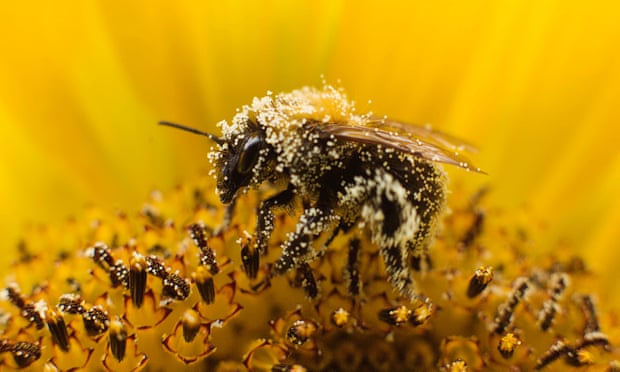Stefanie Christmann of the International Center for Agricultural Research in Dry Areas will present the results of a new study that shows substantial gains in income and biodiversity from devoting a quarter of cropland to flowering economic crops such as spices, oil seeds, medicinal and forage plants.
The UN conference is already debating new guidelines on pollinators that will recommend reducing and gradually phasing out the use of existing pesticides, but Christmann’s research suggests this can be done without financial pain or a loss of production.
The need for a change is increasingly evident. More than 80% of food crops require pollination but the populations of insects that do most of this work have collapsed. In Germany, this fall is by up to 75% over the past 25 years. Puerto Rico has seen an even sharper decline. Numbers are not available in most countries, but almost all report an alarming decline.
Government responses have varied widely. Earlier this year, Brazil, one of the world’s biggest food exporters, went backwards when pro-agribusiness congressmen voted to lift restrictions on pesticides forbidden in other countries.
By contrast, the EU banned the world’s most widely used insecticides – known as neonicotinoids and many European countries are planting wildflowers to attract insects.
But this policy is expensive and brings little or no income to farmers. Christmann has spent the past five years working on a different approach, which she calls “farming with alternative pollinators” with field trials in Uzbekistan and Morocco.
The essence of the technique is to devote one in every four cultivation strips to flowering crops, such as oil seeds and spices. In addition, she provides pollinators with cheap nesting support, such as old wood and beaten soil that ground nesting bees can burrow into. Sunflowers were also planted nearby as wind shelters.
“There is a very low barrier so anyone in even the poorest country can do this. There is no equipment, no technology and only a small investment in seeds. It is very easy. You can demonstrate how to do it with pictures sent on a cellphone.”
Compared with control fields of pure monocultures, “amazing” benefits for farmers and an increase in abundance and diversity of pollinators were found. Crops were pollinated more efficiently, there were fewer pests such as aphids and greenfly, and yields increased in quantity and quality.
In all four different climatic regions that she studied, the total income of farmers increased, though the benefits were most marked on degraded land and farms without honeybees. The biggest gains were in semi-arid climates, where pumpkin yields rose 561%, aubergine 364%, broad bean 177% and melons 56%. In areas with adequate rain, tomato harvests doubled and aubergine went up 250%. In mountain fields, courgette production tripled and pumpkins doubled.
In another study, which is funded by the German environment ministry, Christmann will test a five-year plan to move from work with small pilot projects to large scale producers by inserting flowering strips of canola and other marketable crops to break up monocultures.
She also hopes to see changes in national landscape policies. Working with tourist, agriculture and communication ministries, she aims to raise awareness of the economic benefits of wild pollinators and to encourage more planting of wildflowers, berry bushes and flowering trees.
“The entire environment would be richer, more beautiful and more resilient to climate change,” said the bee evangelist. “We would have many more insects, flowers and birds. And it would be far more self-sustaining. Even the poorest countries in the world could do this.”
As more countries appreciate the advantages, she hopes they will be willing to join the coalition of countries committed to reversing the decline in pollinators. Currently, there are only 24 countries in this “coalition of the willing”, mostly from Europe. Eventually, she hopes there will be enough support to multilateral environmental agreement on pollinators similar to the international convention on trade in endangered species. “I hope this week’s conference will be the first step to bringing a multilateral agreement into being because that’s what we need,” she says.
She expects resistance from agrichemical companies. “I think Monsanto won’t like this because they want to sell their pesticides and this approach reduces pests naturally,” she says.
Christmann is used to adversity. When she first suggested a focus on pollinators at the world agricultural conference in 2010, the delegates laughed at her. For many years, she struggled to gain funds and for two years she had to use her savings to finance her work on pollinator programmes.
Now she has the backing of the German government and a voice on the world stage, the only obstacle is time. “This cannot wait. The bees, flies and butterflies need urgent action. I’m 59 now and I want to to get them globally protected before I retire so I have to hurry,” she says.
The decline of pollinators will be highlighted in a new global report on genetic resources for food that will be released next year. Based on reports from governments across the world, the draft will show that even agriculture ministries – who have long resisted conservation action – are aware of the need for change.
“Countries are saying that we are using too many pesticides and the number of birds and bees is going down. We need to do something about it or our agricultural systems won’t work,” said Irene Hoffmann, who is leading the study for the Food and Agriculture Organisation. “It’s frustrating and sometimes it’s frightening. The situation is dire, but there are ways to solve it.”
The Guardian
More about: science
















































